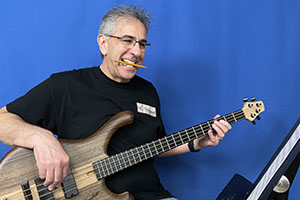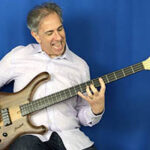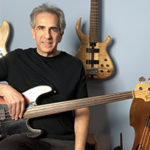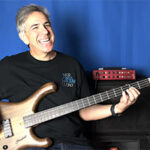It’s not that hard, and the payoff is huge!
By Jon Liebman
February 18, 2022
When you play the bass, how much do you understand about what you’re playing? How much do you want to understand about what you’re playing?
Maybe you can kind of get around the fingerboard okay, doing a halfway decent job with your scales and some of your modes. But wouldn’t it be cool to know a little bit about what’s behind those notes, why we play the notes we play, and how they all fit together?
Maybe you have a nagging voice in the back of your head telling you, “Yeah, I really should learn at least the basics of music theory. That would help me a lot.”
Sound familiar?
Once you start getting into it, music theory really isn’t that hard, especially the basics.
And if you’re telling yourself, “Oh, I just don’t get that kind of stuff. My mind doesn’t work that way,” stop that kind of thinking right now! You’re a smart person. You can do this.
I had a great conversation recently with my old friend Norm Stockton, published as this week’s FBPO interview. In the interview, Norm shares how he always casts a vision for his private students, encouraging them learn a little something about music theory for a payoff in the not-too-distant future.
Naturally, Norm puts an upbeat, friendly spin on it, in his own inimitable way.
Eat your veggies
“For the most part,” Norm says, “my biggest encouragement is for somebody to be willing to eat their veggies for a little bit, for a payoff just slightly down the road.”
A lot of people have a bias against learning music theory because they’re unable to see the need for it.
“There’s a tendency with self-taught players to think that they don’t really need to know anything about theory or anything about the language of music,” Norm says, “They just want to jam.”
While Norm understands where they’re coming from, he also tries to impress upon them the benefits of, well, eating their veggies.
Music theory is not that hard to learn
“Hey, learning diatonic harmony is not that hard,” Norm tells his students, “and once you have it, it will be incredibly helpful for you to be able to then take that and parlay that into other areas of your musical growth.”
And he’s living proof that it’s true. There was a time when Norm was also reluctant to learn about modes, as he didn’t see the need. In fact, he himself found himself saying, “I just want to groove,” or “I just want to rock.”
“But now,” he says, “I can see that that knowledge allowed me to be able to write music, it allowed me to be able to rearrange songs, it allowed me to express myself in a much deeper way than I could when it was entirely by ear.”
If you’re a member of the Bottom Line Club at forbassplayersonly.com, and you’ve gone through the Scales & Theory course or one of the Soloing courses, you get it. You understand what Norm is saying.
Know why you practice what you practice
If you’ve been following my blog for a while, you may have heard me say, “Don’t practice scales for the sake of practicing scales,” or “Don’t learn your modes just because you think it’s good for you.” Do you know what you’re supposed to do with all those notes in order to, you know, make music out of them? That’s what I want my students to know.
Norm concurs. “If you have a passion for music enough to take lessons with somebody,” he says, “then my encouragement is, hey, dig in, spend a little bit of time learning the language of music, learning diatonic harmony, and then you can, you’ll realize, ‘Oh, that’s why I’ve always gone with this fingering. Now it all makes sense,’ It’s kind of explaining why something has always worked by ear, but now you understand the structure behind it.
We’ve all heard about short-term sacrifice for long-term benefits. But who’s to say learning music theory is a sacrifice? It’s actually a blast! The more you get into it, the more likely you are to get hooked. And think of what it will do for your bass playing. Imagine understanding what you’re playing and why you’re playing it. How could you possibly ever regret it?
What about you? Have a thought on the subject? Leave a comment below and let me know what you think. In the meantime, watch my interview with Norm here.
Scales & Theory and Soloing are just a few of the courses inside the Bottom Line Club membership. Want to learn more? Join here!






I am a pretty good musician and have tackled modes as an interesting addition to my conversational knowledge.. but I had developed over time an instinct that cut out “the middleman” of thinking my way through jams & extemporaneous hooks & cuts – any suggestions are appreciated